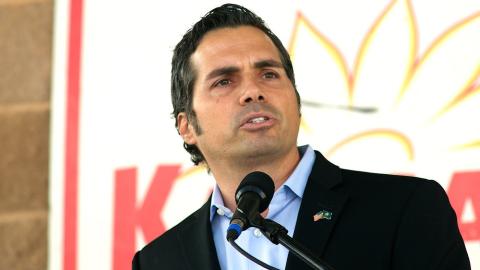Primary season is upon us again. With each passing Tuesday, the major parties across the country are selecting more combatants for November’s electoral battle. By mid-August, thousands of Republicans and Democrats will have been anointed to oppose the other team in the general election.
But despite the countless number of names on the ballot, it’s a process that excludes a large percentage of voters and is the principal driver of a system of government that no longer serves the American people. The broken primary system is allowing the greatness of America to slip away.
It’s no secret that government appears to represent the interests of two increasingly unrepresentative political parties. But few political commentators spend time discussing why the parties have become so unrepresentative or how we can improve the system to be more accountable to the people.
During the primary, we pay the closest attention to the Democrats and Republicans. This is because the nominees of the major parties, in the eyes of the media, the voters, and certainly the political class, immediately become the most viable candidates in the general election. Independent and third party candidates are dismissed by political pundits as spoilers unless they have an ungodly amount of money or celebrity personality.
But, in America, our representative republic was always supposed to serve the people, not a class of people nor members of a political party.
- Today, nearly half of the American electorate consider themselves independent of both political parties.
- In many states, like my home state of Kansas, you cannot vote in a primary election unless you are a member of a major political party. These are knownas “closed” primaries and exist across 14 states.
- In Kansas, more than 30% of voters have actually registered to vote as independents, thereby forfeiting their “right” to participate in a primary.
- Primary election turnout is as low as 10% in many states.
- In nearly 90% of the congressional districts around the country, the districts have been rigged by the ruling party through gerrymandering so the general election is less a competition than a coronation of the ruling parties’ chosen candidate in the primary.
- Primary elections are funded by taxpayers and administered by public officials.
So, who are our representatives really accountable to? The people themselves, or a small partisan base of voters who ensure victory in the primary?
There’s no question that the primary election is an important stage of our public election process. And as the United States Supreme Court has recognized, we cannot have a representative republic unless every voter, regardless of where they live, what color they are, or which party affiliation they have has an equallymeaningful vote at every stage of the election process.
In states like Kansas, however, where nearly 1/3 of the electorate registers as independent, voters who feel unrepresented by either major political party are forced to join one - otherwise, they cannot participate in the primary election. Given how the parties have behaved over the past couple of decades, can you really blame any American who doesn’t want to associate with either one of them?
As long as our election process affords the two major parties and their members exclusive access to the primaries, they will continue to have a state-sanctioned, taxpayer-funded, and anti-competitive monopoly over our most sacred right — the right to vote.
To be clear, I’m not suggesting we get rid of political parties or their primaries. What I am suggesting, to my Republican friends especially, is to consider the value of increased electoral competition just like you champion competition in the business world.
What I’m suggesting to my Democratic friends is a democracy that gives everyone the same rights as you and your membership without having to join your party.
What I’m suggesting is simple, legal, and ripe for Kansans, and perhaps all ofAmerica.
In short, let’s put a public nomination process on the primary ballot — an independent primary — for any voter or candidate who doesn’t want to register as or participate in either of the major party’s primaries. Let’s invite the Libertarian, Green, and all other minor parties to participate.
It would give the 44 percent of Americans who now identify as independents an equal right to vote. It would give independent candidates more exposure to the media, which would rather cover the horse race aspects of an election than the merits of the respective candidates. It would help create a real third force in our politics, thereby creating the competition and accountability that our system of government so desperately needs.
And it would create an incentive for any candidate who wants to participate in that independent primary to speak to voters from across the political spectrum and bring them together.
Editor's Note: This article originally published on Smerconish and has been republished with permission from the author.
